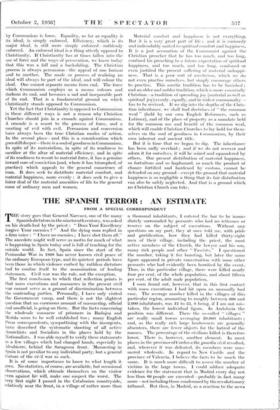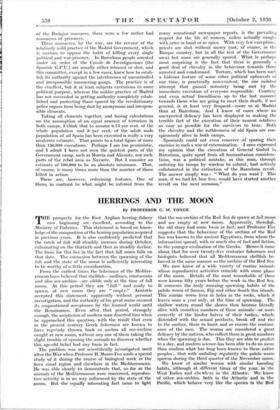THE SPANISH TERROR : AN ESTIMATE
FROM A SPECIAL CORRESPONDENT
The first conclusion to which that reflection points is that mass executions and massacres in the present civil war cannot serve as a ground of discrimination between the contending parties. Personally, I have only visited the Government camp, and there is not the slightest question that an enormous amount of massacring, official and unofficial, is going on there. But the facts concerning the wholesale massacre of prisoners in Badajoz and Merida seem to be well established too ; many English Press correspondents, sympathising with the insurgents, have described the systematic shooting of all active Anarchists and Socialists in the places held by the Nationalists. I was able myself to verify these statements in a few villages which had changed hands, especially in Aleubierre, behind the Saragossa front.. 'Massacring in Spain is not peculiar to any individual party, but a general feature of the civil war as such.
It is of some importance to know to what length it goes. No statistics, of course, are available, but occasional observations, which obtrude themselves on the visitor even against hi" will, make one suspect the worst. The very first night. I passed in the Catalonian countryside, relatively near the front, in a village of rather more than a thousand inhabitants, I entered the bar to be imme- diately surrounded by peasants who had no reticence or reserve on the subject of executions. Without any questions on my part, they at once told me, with pride and gratification, how they had killed thirty-eight men of their village, including the priest, the most active members of the Church, the lawyer and his son, many rich people and other " Fascists." I questioned the number, taking it for boasting, but later the same figure appeared in private conversation with some other peasants who had evidently been horrified by the event. Thus, in this particular village, there were killed nearly four per cent. of the whole population, and about fifteen per cent. of the adult male population.
I -soon found out, however, that in this first contact with mass executions I had hit upon an unusually bad case. The average number killed in the villages of this particular region, amounting to roughly between 800 and 2,000 inhabitants, was 12 to 25, 8 being, if I am not mis- taken, the lowest individual figure. In Andalusia the position was different. There the so-called " villages " are really small towns averaging 20,000 inhabitants ; and, as the really rich large landowners arc generally absentees, there are fewer objects for the hatred of the masses. The percentage of the civilians killed is therefore lower. There is, however, another element. In most places in the province of Cordova the guardia civil revolted, and, wherever it was defeated, its members were mas- sacred wholesale. In regard to New Castile and the province of Valencia, I believe the facts to be much the same. It is much more difficult to assess the number of victims in the large towns. I could adduce adequate evidence for the statement that in Madrid every day not less than 60 people are executed—probably in fact many more—not including those condemned by the revolutionary tribunal. But then, in Madrid, as a reaction to the news of the Badajoz massacre, there were a few rather bad massacres of prisoners.
These massacres, by the way, are the reverse of the relatively mild practice of the Madrid Government, which is anxious to oppose the habit of killing every single political and war-prisoner. In Barcelona people arrested under an order of the Comite de Investigariones (the Spanish G.P.U.) are usually either released or shot, and this committee, except in a few cases, knew how to estab- lish its authority against the interference of uncontrolled and irresponsible massacring gangs. The practice is of the cruellest, but it at least subjects executions to some political purpose, whereas the milder practice of Madrid has not succeeded in getting authority completely estab- lished and protecting those spared by the revolutionary police organs from being shot by anonymous and irrespon- sible elements.
Taking all elements together, and basing calculations on the assumption of an equal amount of terrorism in both camps, I think that to assume 0.75 per cent. of the whole population and 3 per cent. of the adult male population of all Spain has been executed is really a very moderate estimate. That points to a total figure of more than 150,000 executions. Perhaps I am too pessimistic, and I admit I have not seen the quietest parts of the Government camp, such as Murcia and Alicante, nor such parts of the rebel area as Navarre. But I consider an estimate of 100,000 to be an absolute minimum. That, of course, is many times more than the number of those killed in action.
There are, however, redeeming features. One of them, in contrast to what might be inferred from the miny sensational newspaper reports, is the prevailing respect for the life Of women,' unless actually caught with arms in hand or as spies. With very few -exceptions, priests are shot without mercy (not, of course, in the Basque country, but in all the rest of the Government area) but nuns are generally spared. What is perhaps most surprising is the fact that 'there is generally a good deal of chivalry in the behaviour towards those arrested and condemned. Torture, which has been such a hideous feature of some other political upheavals of our time, is practically non-existent, the one isolated attempt that gained notoriety being met by the immediate execution of everyone responsible. Courtesy and even actual friendliness up to the last moment towards those who are going to meet their death, if not general, is at least very frequent—more so at Madrid than at Barcelona. And I know of cases where an unexpected delicacy has been displayed in making the terrible fact of the execution of their nearest relatives as easy as possible for the survivors to bear. Both the chivalry and the ruthlessness of old Spain are con- spicuously alive in both camps.
Spaniards could not even conceive of sparing their enemies in such a war of extermination. I once expressed my opinion that the execution of General Goded in Barcelona, quite apart from all humanitarian considera- tions, was a political mistake, as this man, through ordering his troops by wireless to submit, had actively collaborated in the extinction of the Barcelona revolt. The answer simply was : " What do you want ? This man, if we had let him live, would have started another revolt on the next occasion."











































 Previous page
Previous page